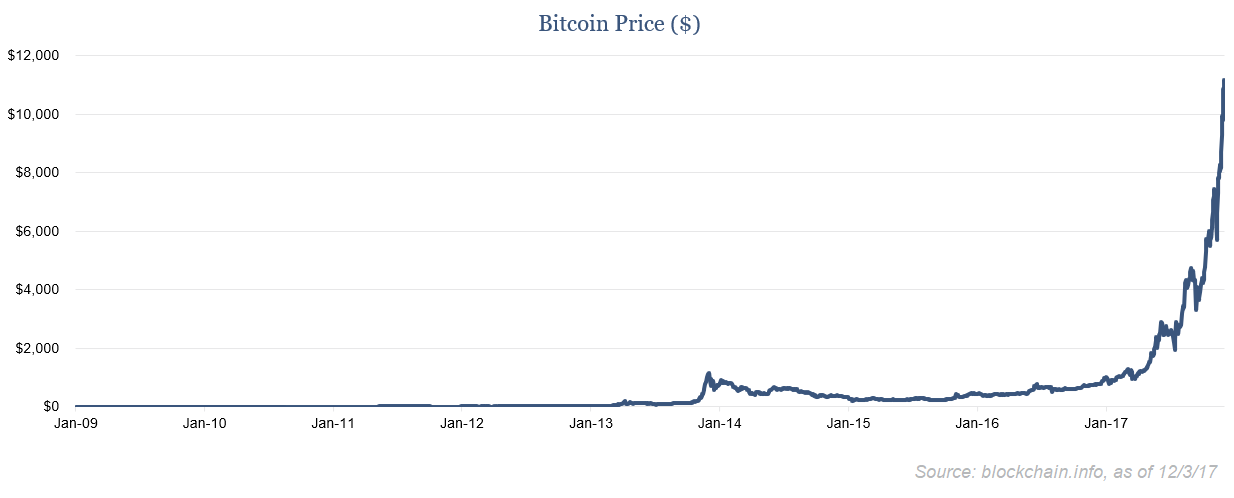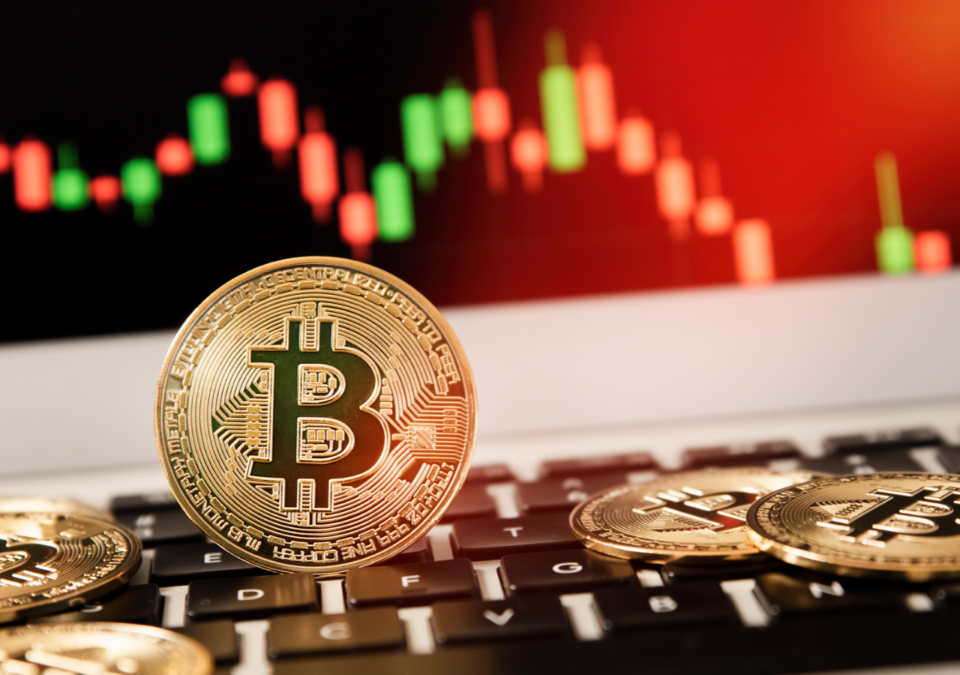One of the first notable transactions using bitcoin was made in May 2010. A member of an online bitcoin forum posted a message stating “I’ll pay 10,000 bitcoins for a couple of pizzas…” At the time, one bitcoin was trading around fractions of a penny, so not an unreasonable request by this enterprising person. Fast forward to today when the bitcoin price hovers above $10,000, and we can collectively gasp at the thought of spending what would’ve been $100 million for a delicious meal and leftovers.
Introduction
First off, he probably should have used his credit card to buy pizza… Secondly, “what is bitcoin?” Fully understanding the ever-expanding world of virtual currencies is beyond most people’s comprehension, including ours; however, having followed and owned bitcoin over the past few years, we have identified some interesting and applicable takeaways worth sharing.
Our goal for this article is to provide the reader with a relatable and basic understanding of bitcoin and its potential uses as a currency and an investment. We will not address the underlying technology (blockchain), the architecture behind a transaction, or the dynamics surrounding the general ecosystem. Our objective is to make you sound competent enough to have an informed (and witty) response when your kid asks, “can I have bitcoin for my birthday?”
The Basics
What is bitcoin?
It is a digital currency created and held electronically – you’ll never hold it in your hand. It’s fascinating to think that with all of the innovation surrounding us, currency would also fall into this realm. But that’s essentially what happened in 2009 when a paper detailing the concept for a peer-to-peer exchange network emerged online from a pseudonymous author who goes by Satoshi Nakamoto (fun fact – no one knows who actually invented bitcoin as no credible author/inventor has come forward to claim it). This concept, the protocol technology (blockchain), and the currency built for it (bitcoin), offered a way for individuals to make payments to one another, bypassing the traditional gatekeepers like banks and processors – fundamentally creating a currency for the internet age that eliminated the middle man.
What isn’t bitcoin?
Unlike traditional currencies, bitcoin is not issued by any single institution or backed by a central government (like the U.S. dollar). And in contrast to the U.S. dollar supply, which can be increased or decreased by the U.S. Treasury, there is a finite amount of bitcoin available (21 million).
How do you get it?
Thankfully, it doesn’t take a computer science background for one to obtain bitcoin. You can buy it on the internet and hold it in a digital (virtual) wallet. These digital wallets, which are not affiliated with any bank or financial institution, allow users to purchase bitcoin (typically for U.S. dollars) and store them in their new wallet. If you have a PayPal or Venmo account, the user experience is fairly similar.
Where can you use it?
During bitcoin’s early days, it was used predominantly as the go-to currency for the black market – its perceived characteristic of being untraceable appealed to those wishing to avoid watchful eyes. Bitcoin transactions have since shifted to more credible and legal commerce as retailers have begun to embrace it and authorities have gotten smarter about cracking down on the illicit marketplaces. As it stands today, the market acceptance for bitcoin as a form of currency is still fairly nascent. Out of the top 500 internet retailers, there are only a handful that accept bitcoin as payment.
Why am I hearing more about it?
The price of bitcoin and other virtual currencies has been on a tear this year, and with that comes increased media coverage, investor focus, and speculation. The hope for bitcoin enthusiasts is that the currency will continue to shed its illicit past and emerge as a viable medium of exchange in global commerce. While that path appears possible, its trajectory pales in comparison to the price appreciation seen recently.

Observations and Advice
Bitcoin is a currency, an investment, and/or a religion depending on whom you ask. We are going to avoid a philosophical debate regarding the merit of holding a decentralized currency and instead share a few key observations and provide our thoughts on bitcoin’s primary applications – currency and investment.
There are hundreds, if not thousands, of digital currencies out there.
While bitcoin may be the biggest and most recognizable digital currency, its dominance is being eroded by the emergence of several fast followers. There is no way to know which of these, if any, will survive or thrive in our increasingly digital world.
Bitcoin is based on/in technology, and technology can be hacked.
If you read stories about hacking bitcoin, it usually occurs within the exchanges or emerging infrastructure that is used to transfer, store, or create the digital currency. When you check your traditional bank accounts online, you feel confident that your accounts are safe at the institution. With digital currencies, there is still an element of the wild west when it comes to storing and transferring the value of these holdings. Certain platforms are gaining credibility and improving their security, but vulnerable points will continue to be targeted and exploited.
Should I acquire bitcoin and buy things with it?
The short answer is no because there are very few retailers that currently accept it (though the number is growing). You cannot pay tuition, medical bills, or utility bills with it. Even purchasing a cup of coffee at that trendy coffeehouse that accepts it might not make sense when you layer on the transaction fees. But, if you want to impress your social circle, use it to buy a Tesla.
Should I invest in bitcoin?
It’s extremely speculative from an investment standpoint. Not only does the daily price of bitcoin fluctuate wildly (in U.S. dollar terms), but the fate of its future existence is debatable. While bitcoin was the first digital currency to emerge, it could easily fail in the long run. Look back at any emerging industry within technology, and you’ll see winners don’t necessarily invent their markets (Google was the 21st search engine to come along, Friendster and MySpace preceded Facebook, etc.).
It’s also unlikely that investors will come to any consensus as to the price at which bitcoin should be valued, making it a speculative playground. For those who wish to invest, do so only with an amount you can tolerate going to zero. Taken from experience, the emotional rollercoaster bitcoin provides dwarfs any traditional stock or bond holding.
For more on investing in trends, check out The Trend is Not Necessarily Your Friend by John Jennings


